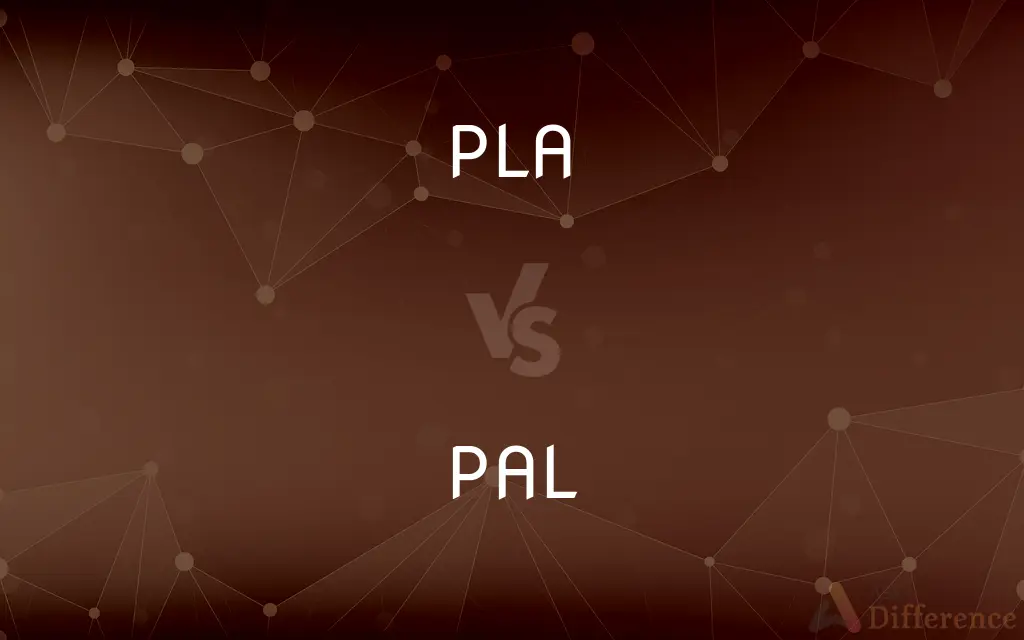PLA vs. PAL — What's the Difference?
By Tayyaba Rehman — Published on January 10, 2024
Programmable Logic Array and Programmable Array Logic are programmable logic devices. PLA offers more complex logic functions and flexibility with multiple inputs and outputs, while PAL has simpler structures, limited inputs, and fixed AND gates.

Difference Between PLA and PAL
Table of Contents
ADVERTISEMENT
Key Differences
PLA, a Programmable Logic Array, offers flexible programming with multiple inputs, outputs, and logic operations, allowing complex combinational circuits.
PAL, a Programmable Array Logic, comprises fixed AND gates feeding into OR gates, offering simpler designs with limited inputs and outputs.
Utilizes a matrix of AND gates feeding into OR gates, facilitating versatile logic functions and enabling a variety of circuit designs.
Comprises a simpler structure, where inputs feed into fixed AND gates followed by OR gates, restricting flexibility in design but ensuring straightforward implementation.
Suited for complex logic functions and diverse circuit designs due to its programmable structure and versatile array of logic gates.
ADVERTISEMENT
More suitable for simpler logic operations and designs due to its fixed AND-OR structure with limited programmability.
Comparison Chart
Structure
Utilizes a matrix of programmable gates
Consists of fixed AND gates feeding into OR gates
Flexibility
Offers more flexibility in circuit designs
Provides limited flexibility in design
Complexity
Suited for complex logic functions
Ideal for simpler logic operations
Programming
Programmable structure for varied designs
Less programmable, fixed structure
Logic Operations
Supports diverse logic operations
Limited to simple logic with fixed gates
Compare with Definitions
PLA
Utilizes a matrix of programmable gates.
PLA uses a matrix of gates to create complex logic circuits.
PAL
Programmed Array Logic with fixed gates.
PAL uses fixed gates for straightforward logic operations.
PLA
Programmable Logic Array with multiple inputs.
PLA allows complex logic design with numerous inputs.
PAL
Provides limited design flexibility.
The PAL's fixed structure limits varied circuit designs.
PLA
Supports varied combinational circuitry.
PLA's flexibility suits diverse combinational logic.
PAL
Fixed structure restricts programmability.
PAL's fixed gate configuration restricts design alterations.
PLA
Suited for complex logic operations.
PLA facilitates intricate logic operations in electronic circuits.
PAL
Structure includes fixed AND gates and OR gates.
PAL comprises fixed gates for simple logic implementations.
PLA
Offers versatile logic functions and programming.
The PLA's programmable structure enables diverse circuit designs.
PAL
Suited for simpler logic tasks.
PAL is useful for basic logic operations in electronic devices.
Common Curiosities
Can a PLA perform simpler logic operations?
Yes, while designed for complexity, a PLA can handle simpler logic tasks as well.
How does a PLA differ from a PAL structurally?
A PLA consists of a matrix of programmable gates, while a PAL comprises fixed AND gates feeding into OR gates.
Can a PAL structure be reprogrammed?
PAL devices generally have fixed configurations and limited reprogramming capabilities compared to PLA.
Is PAL more cost-effective than PLA?
PAL devices might be cost-effective for simpler designs due to their fixed structures compared to more versatile but potentially costlier PLAs.
Can PAL devices support complex circuits?
PAL devices are more suited for simple logic; they might not efficiently handle highly complex circuitry.
Is PLA more programmable than PAL?
Yes, PLA devices offer more programming flexibility compared to PAL devices.
Share Your Discovery

Previous Comparison
Molar Mass vs. Atomic Mass
Next Comparison
Watermarking vs. SteganographyAuthor Spotlight
Written by
Tayyaba RehmanTayyaba Rehman is a distinguished writer, currently serving as a primary contributor to askdifference.com. As a researcher in semantics and etymology, Tayyaba's passion for the complexity of languages and their distinctions has found a perfect home on the platform. Tayyaba delves into the intricacies of language, distinguishing between commonly confused words and phrases, thereby providing clarity for readers worldwide.











































